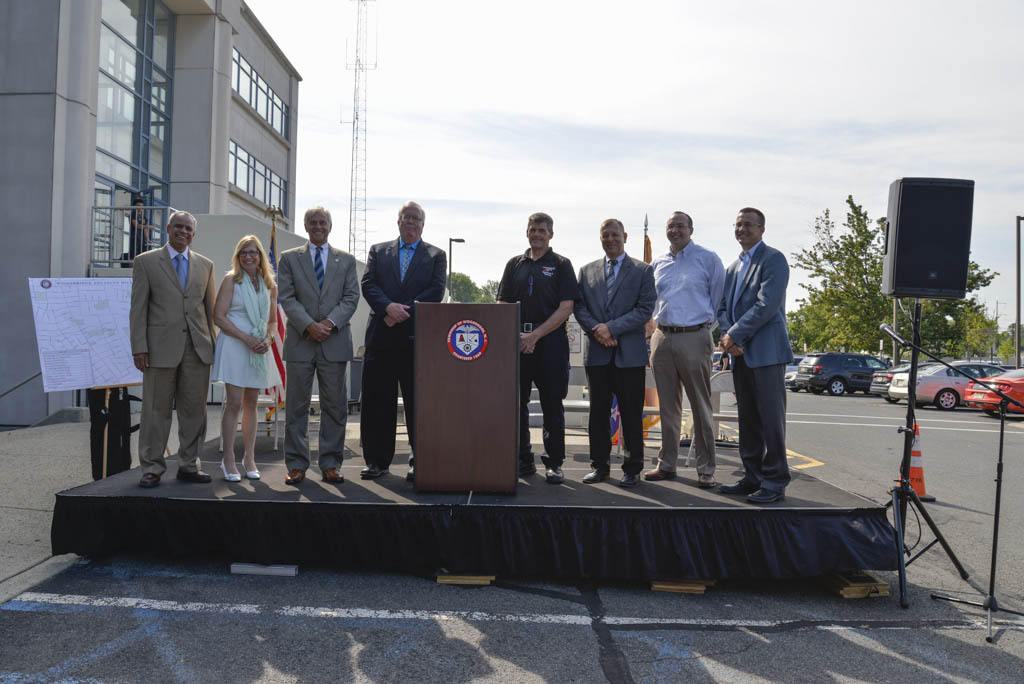WOODBRIDGE — Critical facilities in the township will be able to remain operational in the event of major storms through a proposed Town Center Distributed Energy Resource Microgrid.
The New Jersey Board of Public Utilities (BPU) highlighted the board’s approval of Woodbridge Township’s application for a feasibility study to implement the proposed town center microgrid at a press conference on Aug. 21.
The township’s proposed microgrid, which is one of 13 town center microgrids that the BPU approved for funding of feasibility studies, would include use of fuel cells and solar energy to power critical facilities, improving storm resiliency.
BPU President Richard S. Mroz, BPU Commissioner Upendra Chivukla, Woodbridge Township Mayor John E. McCormac and township officials came together for the press conference.
“The Christie Administration continues to receive enthusiastic support for microgrid technology from the Board, municipalities and townships from across the state,” Mroz said. “These grid independent energy sources will improve energy resiliency and reliability keeping critical services operational during blackouts.”
In the aftermath of Superstorm Sandy in 2012, the Christie Administration made it a priority to improve energy resiliency and the emergency preparedness and response of the utility companies.
The 2015 state Energy Master Plan (EMP) Update contained a new section on hardening and improving utility infrastructure resiliency which supports the establishment of Distributed Energy Resources (DER) such as microgrids to improve the grid’s resiliency and reliability in the event of a major emergency.
The EMP Update also directed the Board to continue its work with the utility companies, local, state and federal governments, and other strategic partners to identify, design and implement Town Center DER microgrids to power critical facilities and services across the state.
A microgrid is a small or local electric power system that can operate with the main grid or by itself in an emergency situation within a specific area like a hospital, school/college or an entire community.
Microgrids are intended to be used during heavy electric demand periods (peak) or for electrical back up purposes when the main grid is off line.
Woodbridge Township submitted an application for a feasibility study for a Woodbridge Township Advanced Micro grid (WAM) with core partners including the Woodbridge Township School District, Woodbridge Housing Authority and a number of private sector entities.
The Woodbridge Township Microgrid would connect private entities and services and critical facilities within the microgrid, offering the benefits of allowing those facilities to remain operational while the power grid is down and providing increased energy efficiency for those facilities.
“Almost immediately after Superstorm Sandy, the New Jersey Board of Public Utilities undertook the mission assisting municipalities to explore alternative energy and provide funding to help modernize, harden and power local infrastructures,” McCormac said. “We welcome NJBPU President Mroz to Woodbridge and gratefully accept the $150,000 grant to help power-up our future Town Centered Advanced Microgrid.”
After the press conference, officials took a quick tour of the Woodbridge Police Department’s Communication Center, a facility that can be powered by microgrid technology in an event of a power outage.
According to Woodbridge’s microgrid application, the critical facilities include Town Hall/Police building, Woodbridge Fire Department building, Stern Tower Senior Living, Adams Tower Senior Living, Finn Tower Senior Living, Woodbridge Pump Station, Ross Street Elementary School No. 11, Mawbey Street Elementary School and Woodbridge Middle School.
The study will evaluate new power capacity which may include fuel cells, solar and dispatchable generation such as combined heat and power and other new electric infrastructure to allow the proposed microgrid to operate during normal and emergency conditions.
The estimated timeframe to complete the feasibility study is 12 months. The total incentive amount is $150,000 for Woodbridge.
The board established a Town Center Distributed Energy Resource Microgrid Feasibility Study program with a budget of $1 million.
However, on June 30, after receiving and evaluating 13 applications for proposed microgrids and the potential benefits offered, the board approved a budget modification to fund all 13 applications at a total cost of $2.1 million.
The program was developed to provide incentives for local and state government agencies to study the feasibility of Town Center DER microgrids.
The board approved funding for applications submitted by Atlantic City, Camden County, Cape May County Municipal Utilities Authority, Galloway Township, Highland Park, Hoboken, Hudson County, Middletown Township, Montclair Township, Neptune Township, Paterson and Woodbridge Township.

